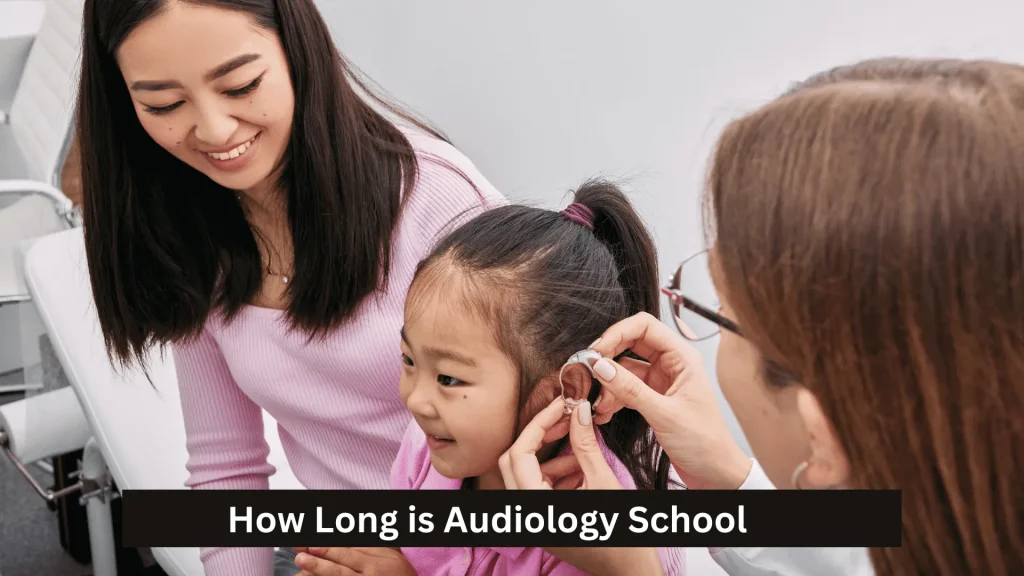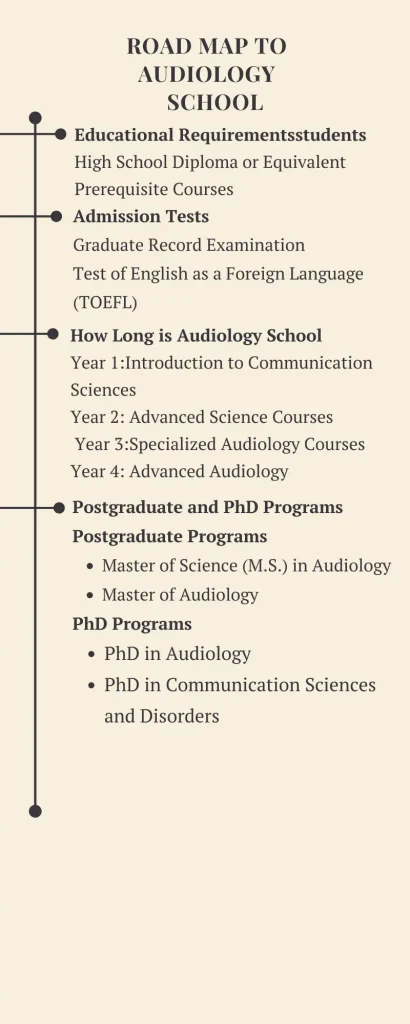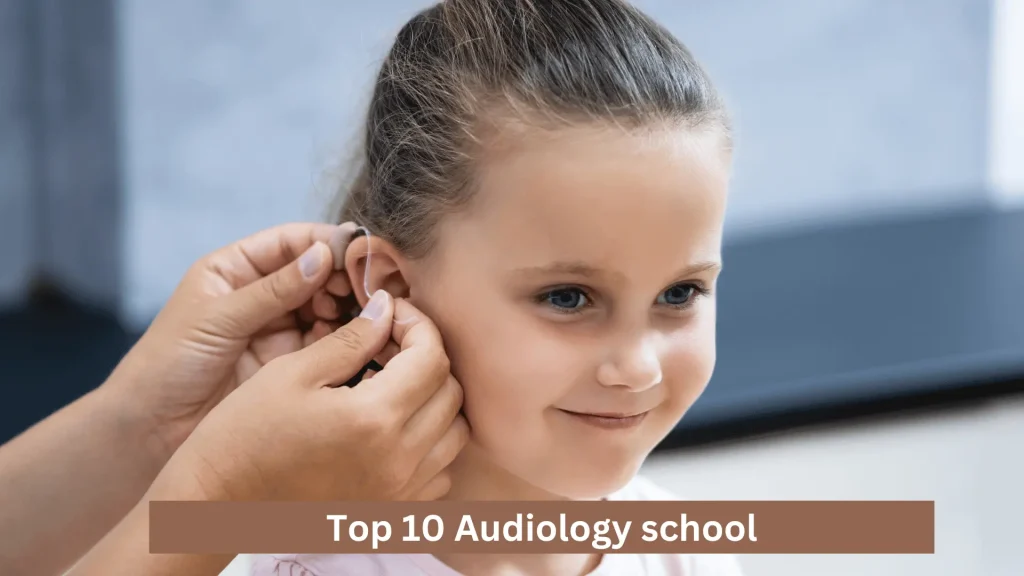How Long is Audiology School? It typically takes about eight years. This includes earning a bachelor’s degree in a related field, which takes four years, followed by a Doctor of Audiology (Au.D.) program, which usually takes an additional four years.
What is Audiology School
Audiology school is a specialized educational pathway designed to train students to become audiologists. These programs focus on diagnosing and treating hearing and balance disorders. The curriculum combines classroom instruction with clinical practice, covering subjects like anatomy, physiology, acoustics, and hearing aid technology.

Graduates of audiology school earn a Doctor of Audiology (Au.D.) degree, preparing them for licensure and practice in various settings, such as hospitals, private practices, and research facilities. The rigorous training ensures audiologists are equipped to provide comprehensive hearing care and contribute to advancements in auditory health.
How Long is Audiology School
Year 1: Foundational Sciences and General Education
Fall Semester:
- General Biology I: Introduction to biological principles, including cell biology, genetics, and evolution.
- General Chemistry I: Basic principles of chemistry, including atomic structure, bonding, and reactions.
- Introduction to Psychology: Basics of psychological theories and practices.
- English Composition: Development of writing skills, focusing on academic and scientific writing.
- Introduction to Communication Disorders: Overview of communication disorders, including speech, language, and hearing.
Spring Semester:
- General Biology II: Further study of biological systems, including physiology, ecology, and biodiversity.
- General Chemistry II: Continuation of chemistry principles, focusing on chemical kinetics, equilibrium, and thermodynamics.
- Introduction to Sociology: Basics of sociological theories and concepts.
- Statistics: Basic concepts of statistical analysis and probability.
- Phonetics: Study of speech sounds and their production, classification, and transcription.
Year 2: Intermediate Sciences and Core Pre-Audiology Courses
Fall Semester:
- Anatomy and Physiology I: Structure and function of the human body.
- Physics I: Fundamentals of physics, including mechanics, motion, and energy.
- Language Development: Study of typical language development in children.
- Hearing Science: Introduction to the physics and biology of hearing.
- Research Methods: Introduction to scientific research, experimental design, and data analysis.
Spring Semester:
- Anatomy and Physiology II: Continued study of human body systems.
- Physics II: Continuation of physics, covering electricity, magnetism, and waves.
- Introduction to Audiology: Basics of audiology, including hearing assessment and hearing disorders.
- Neuroscience for Communication Disorders: Study of the nervous system as it relates to communication.
- Speech and Hearing Mechanisms: Structure and function of the speech and hearing systems.
Year 3: Advanced Sciences and Specialized Courses
Fall Semester:
- Acoustics: Study of sound, its properties, and its interaction with different environments.
- Speech and Language Disorders: Exploration of various speech and language disorders.
- Aural Rehabilitation: Techniques and strategies for helping individuals with hearing loss.
- Developmental Psychology: Study of human development across the lifespan.
- Elective: Choose a course in a specialized area of interest.
Spring Semester:
- Audiological Assessment: Techniques and tools used for assessing hearing and balance.
- Clinical Methods in Audiology: Introduction to clinical practices and patient management.
- Pediatric Audiology: Focus on hearing disorders and assessments in children.
- Ethics in Communication Disorders: Ethical considerations in the practice of audiology and speech-language pathology.
- Elective: Further specialization in a chosen area of interest.
Year 4: Preparation for Graduate School and Clinical Experience
Fall Semester:
- Advanced Audiological Assessment: In-depth techniques for hearing and balance assessment.
- Amplification Systems: Study of hearing aids and other assistive listening devices.
- Capstone Research Project: Independent research project under faculty supervision.
- Clinical Observation: Observation of clinical practice in audiology settings.
- Elective: Additional coursework in a specialized area.
Spring Semester:
- Vestibular Assessment and Management: Study of balance disorders and their management.
- Professional Issues in Audiology: Exploration of professional practice issues, including licensure and certification.
- Clinical Practicum: Hands-on clinical experience under supervision.
- Elective: Further advanced coursework or independent study.
- Graduate School Application Preparation: Guidance and support for the application process to audiology graduate programs, including writing personal statements and preparing for interviews.

How to Enter Audiology School
Educational Requirements
High School Diploma or Equivalent: Completion of high school with a focus on science courses like biology, chemistry, and physics.
Undergraduate Degree: A bachelor’s degree in communication sciences and disorders or a related field is often required.
Prerequisite Courses: Completion of prerequisite courses in areas such as anatomy, physiology, physics, and statistics.
Entry Tests
Graduate Record Examination (GRE): Many audiology programs require GRE scores as part of the application.
Test of English as a Foreign Language (TOEFL): For international students, a TOEFL score may be required to demonstrate English proficiency.
Application Process
Research Programs: Identify audiology programs that meet your educational and career goals.
Submit Transcripts: Provide official transcripts from all previous educational institutions.
Letters of Recommendation: Obtain letters from professors or professionals who can attest to your academic and clinical potential.
Personal Statement: Write a personal statement outlining your interest in audiology, career goals, and relevant experiences.
Application Fee: Pay the required application fee for each program you apply to.
Interview: Participate in an interview if required by the program.
Financial Aids
Scholarships: Many universities offer scholarships based on academic merit, financial need, or specific criteria related to audiology.
Grants: Federal and state grants are available for students who demonstrate financial need.
Loans: Federal student loans, such as Stafford and Perkins loans, are available. Private loans are also an option.
Work-Study Programs: Part-time employment opportunities within the university to help cover educational expenses.
Assistantships: Graduate assistantships that provide a stipend and tuition waiver in exchange for teaching or research work.
These steps and resources can help prospective students navigate the process of applying to audiology school and securing financial support.
Postgraduate and PhD Programs in Audiology
Postgraduate Programs
1. Doctor of Audiology (Au.D.)
Duration: Typically 4 years.
Curriculum: Includes advanced coursework in audiology, clinical practice, and research methods. Focuses on diagnosing and treating hearing and balance disorders.
Clinical Practicum: Extensive hands-on training in various clinical settings.
Capstone Project: A research project or clinical case study is often required.
2. Master of Science (M.S.) in Audiology
Duration: 2 years (less common, as most programs are at the doctoral level).
Curriculum: Combines coursework in audiological science and clinical practice. Provides foundational knowledge but may not be sufficient for licensure in some regions.
Clinical Experience: Includes supervised clinical placements.
Thesis: Often requires completion of a research thesis.
PhD Programs in Audiology
1. PhD in Audiology
Duration: Typically 4-6 years.
Curriculum: Focuses on advanced research, theoretical foundations, and specialized topics in audiology. Includes coursework in research methodology and statistics.
Research Component: Requires original research, culminating in a dissertation.
Clinical Training: Some programs may include clinical components, though the focus is more on research and academia.
2. PhD in Communication Sciences and Disorders
Duration: Typically 4-6 years.
Curriculum: Covers a broad range of topics in communication disorders, including audiology, speech-language pathology, and research methods.
Research Component: Emphasis on conducting original research, with a dissertation required.
Specialization: Allows for a focus on audiology within a broader communication sciences context.
Top 10 Audiology Schools

1.University of Florida
Program: Doctor of Audiology (Au.D.)
Notable: Renowned for its research and clinical training facilities.
2.University of Washington
Program: Doctor of Audiology (Au.D.)
Notable: Offers a comprehensive curriculum with a focus on clinical practice and research.
3.University of Pittsburgh
Program: Doctor of Audiology (Au.D.)
Notable: Known for its strong emphasis on evidence-based practice and interdisciplinary collaboration.
4.Vanderbilt University
Program: Doctor of Audiology (Au.D.)
Notable: Offers extensive clinical training and research opportunities in a leading medical center.
5.University of Arizona
Program: Doctor of Audiology (Au.D.)
Notable: Features a robust research component and clinical practicum experiences.
6.Northwestern University
Program: Doctor of Audiology (Au.D.)
Notable: Provides a well-rounded education with a strong emphasis on research and clinical skills.
7.University of Iowa
Program: Doctor of Audiology (Au.D.)
Notable: Offers extensive clinical training and a strong focus on auditory and vestibular sciences.
8.University of Illinois Urbana-Champaign
Program: Doctor of Audiology (Au.D.)
Notable: Known for its research facilities and strong academic curriculum.
9.University of North Carolina at Chapel Hill
Program: Doctor of Audiology (Au.D.)
Notable: Emphasizes clinical practice and research, with a focus on community service.
10.Boston University
Program: Doctor of Audiology (Au.D.)
Notable: Offers a comprehensive audiology program with a focus on both clinical and research aspects.
These programs are highly regarded for their rigorous training, clinical experiences, and research opportunities in audiology.
The Length of Audiology School
1. Program Type
- Doctor of Audiology (Au.D.): Typically a 4-year program, including coursework, clinical training, and research.
- Master’s Programs: Some programs may be shorter but are less common as most audiologists pursue doctoral-level education.
2. Full-Time vs. Part-Time Enrollment
- Full-Time: Usually completed in the standard duration (e.g., 4 years for Au.D. programs).
- Part-Time: May extend the length of the program, depending on the student’s pace and schedule.
3. Undergraduate Preparation
- Prerequisite Courses: Students lacking some prerequisites may need additional time to complete them before starting the Au.D. program.
- Bachelor’s Degree: If the student needs to complete a degree in a related field before entering the doctoral program, this can add time.
4. Clinical Training Requirements
- Clinical Hours: The number of required supervised clinical hours can vary by program, impacting the overall length.
- Internships and Practicums: Extended or additional clinical placements may affect the duration.
5. Research Component
- Capstone Projects or Theses: The time required to complete research projects or theses can extend the length of the program.
- Dissertation (PhD Programs): For those pursuing a PhD, the research and dissertation phase can significantly impact the total time required.
Final Verdict
The length of audiology school varies based on program type, enrollment status, and individual circumstances. Understanding these factors helps prospective students plan effectively and navigate their educational journey toward becoming a licensed audiologist.
FAQs
1.How long does it take to complete an Au.D. program?
Typically 4 years, including coursework, clinical training, and research.
2.Can I complete an audiology program part-time?
Yes, but it may extend the overall length of the program.
3.What undergraduate preparation is needed for audiology school?
A bachelor’s degree in a related field and specific prerequisite courses are usually required.
4.What factors can affect the duration of my audiology school program?
Factors include program type, enrollment status, clinical training requirements, and personal circumstances.
5.Do PhD programs in audiology take longer than Au.D. programs?
Yes, PhD programs typically take 4-6 years due to the extensive research component.
